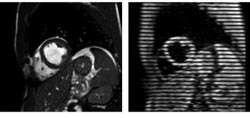Cardiac MRI reveals energy drinks alter heart function

To visualize cardiac magnetic resonance tagging, a cross-section of the heart in common imaging technique is seen on the left and tagged myocardium using CSPAMM on the right.<br><br>Credit: Radiological Society of North America<br>
“Until now, we haven't known exactly what effect these energy drinks have on the function of the heart,” said radiology resident Jonas Dörner, M.D., of the cardiovascular imaging section at the University of Bonn, Germany, which is led by the study's principal investigator, Daniel K. Thomas, M.D. “There are concerns about the products' potential adverse side effects on heart function, especially in adolescents and young adults, but there is little or no regulation of energy drink sales.”
Energy drinks represent a multibillion dollar industry that is growing every day. While teenagers and young adults have traditionally been the largest consumers, in recent years more people of all demographics have begun consuming energy drinks.
A 2013 report from the Substance Abuse and Mental Health Services Administration stated that in the U.S. from 2007 to 2011, the number of emergency department visits related to energy drink consumption nearly doubled, increasing from 10,068 to 20,783. Most of the cases were identified among patients aged 18 to 25, followed by those aged 26 to 39.
“Usually energy drinks contain taurine and caffeine as their main pharmacological ingredients,” Dr. Dörner said. “The amount of caffeine is up to three times higher than in other caffeinated beverages like coffee or cola. There are many side effects known to be associated with a high intake of caffeine, including rapid heart rate, palpitations, rise in blood pressure and, in the most severe cases, seizures or sudden death.”
For the study, which is ongoing, Dr. Dörner and colleagues used cardiac magnetic resonance imaging (MRI) to measure the effect of energy drink consumption on heart function in 18 healthy volunteers, including 15 men and three women with a mean age of 27.5 years. Each of the volunteers underwent cardiac MRI before and one hour after consuming an energy drink containing taurine (400 mg/100 ml) and caffeine (32 mg/100 ml).
Compared to the baseline images, results of cardiac MRI performed one hour after the study participants consumed the energy drink revealed significantly increased peak strain and peak systolic strain rates (measurements for contractility) in the left ventricle of the heart. The heart's left ventricle receives oxygenated blood from the lungs and pumps it to the aorta, which distributes it throughout the rest of the body.
“We don't know exactly how or if this greater contractility of the heart impacts daily activities or athletic performance,” Dr. Dörner said. “We need additional studies to understand this mechanism and to determine how long the effect of the energy drink lasts.”
The researchers found no significant differences in heart rate, blood pressure or the amount of blood ejected from the left ventricle of the heart between the volunteers' baseline and second MRI exams.
“We've shown that energy drink consumption has a short-term impact on cardiac contractility,” Dr. Dörner said. “Further studies are needed to evaluate the impact of long-term energy drink consumption and the effect of such drinks on individuals with heart disease.”
Dr. Dörner said that while long-term risks to the heart from drinking energy drinks remain unknown, he advises that children, as well as people with known cardiac arrhythmias, should avoid energy drinks, because changes in contractility could trigger arrhythmias. He also cautions that additional study is needed to address risks posed by the consumption of energy drinks in combination with alcohol.
Other co-authors are Daniel Kuetting, M.D., Claas P. Naehle, M.D., and Hans H. Schild, M.D.
Note: Copies of RSNA 2013 news releases and electronic images will be available online at RSNA.org/press13 beginning Monday, Dec. 2.
RSNA is an association of more than 53,000 radiologists, radiation oncologists, medical physicists and related scientists, promoting excellence in patient care and health care delivery through education, research and technologic innovation. The Society is based in Oak Brook, Ill. (RSNA.org)
For patient-friendly information on cardiac MRI, visit RadiologyInfo.org.
Media Contact
More Information:
http://www.rsna.orgAll latest news from the category: Health and Medicine
This subject area encompasses research and studies in the field of human medicine.
Among the wide-ranging list of topics covered here are anesthesiology, anatomy, surgery, human genetics, hygiene and environmental medicine, internal medicine, neurology, pharmacology, physiology, urology and dental medicine.
Newest articles

Silicon Carbide Innovation Alliance to drive industrial-scale semiconductor work
Known for its ability to withstand extreme environments and high voltages, silicon carbide (SiC) is a semiconducting material made up of silicon and carbon atoms arranged into crystals that is…

New SPECT/CT technique shows impressive biomarker identification
…offers increased access for prostate cancer patients. A novel SPECT/CT acquisition method can accurately detect radiopharmaceutical biodistribution in a convenient manner for prostate cancer patients, opening the door for more…

How 3D printers can give robots a soft touch
Soft skin coverings and touch sensors have emerged as a promising feature for robots that are both safer and more intuitive for human interaction, but they are expensive and difficult…





















